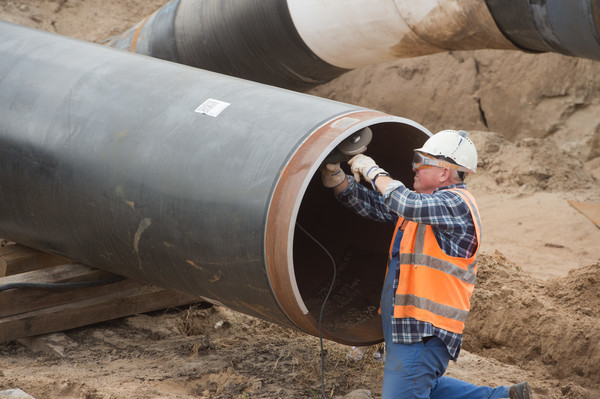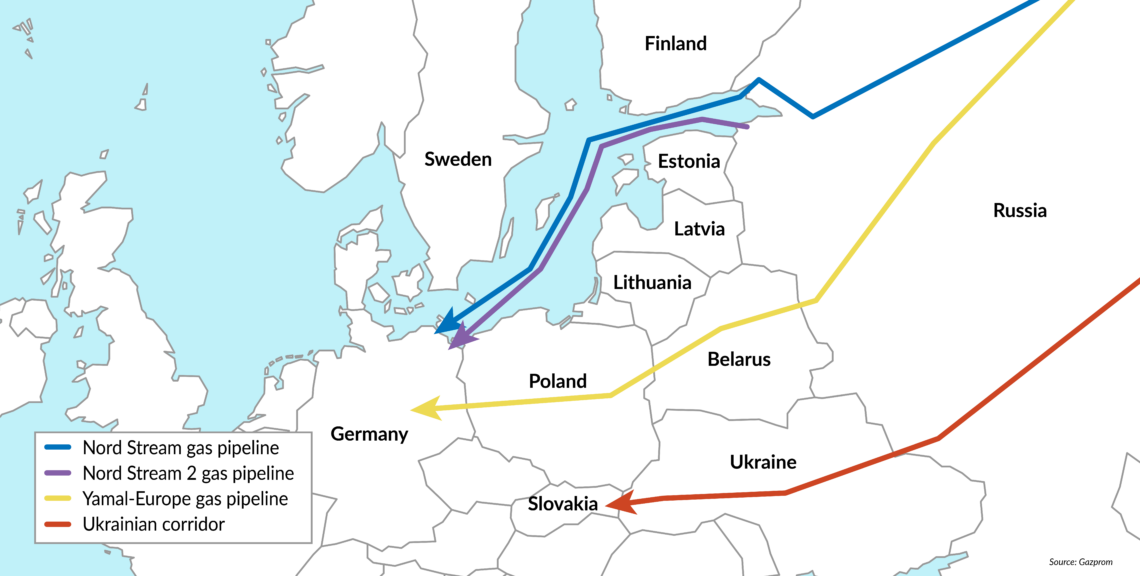Focus Germany: The Nord Stream 2 headache
Germany insists on backing The Nord Stream 2 project. By doing so, it could reap the economic benefits of becoming a hub for Russian gas imports, but serious conflicts over the matter are likely to arise within the EU.

In a nutshell
- Berlin maintains that Nord Stream 2 is a purely commercial initiative despite its obvious political benefits for Russia
- Ukraine could have become an energy hub for Central Europe if not for the systemic corruption of its oil industry
- The new pipeline could be delayed by legal setbacks, but once completed it will boost Russia’s geopolitical leverage
GIS’s Focus Germany series examines key issues facing the European Union’s most crucial member and the continent’s economic powerhouse.
Natural gas has long been something of a curse for Ukraine. Ever since it gained independence in 1991, the country seems to be the hapless victim of Russia’s energy bullying. Repeated conflicts over pricing have culminated in two “gas wars,” with severe repercussions for EU member states dependent on Russian gas. As the current year draws to a close, the stage is set for yet another round in this ongoing drama. This time, Germany will enter the fray – and internal EU cohesion and transatlantic relations between Europe and the United States are at stake.
The triggering factor is the expiry of a gas transit agreement between Russian Gazprom and Ukrainian Naftogaz, the two national gas giants that have been at the forefront of all prior conflicts. This termination coincides with the anticipated completion of two new pipelines that will greatly enhance Russian export capacity, namely, Nord Stream 2 and TurkStream. Once they have become operational, Gazprom will be able to meet the entire demand of its European customers without using the Ukrainian Gas Transport System (GTS).
Kiev cries foul and claims the sole purpose of the new pipelines is to make it possible for Russia to pump gas directly into Europe without going through Ukraine. The implication is that Kiev will not only lose transit fees, estimated at $2-3 billion annually (about 3 percent of its GDP), but also geopolitical leverage. Russia retorts that Nord Stream 2 is a purely commercial project, providing cheaper and more reliable gas for Europe.
Poland and the Baltic states provide vociferous support for the Ukrainian position, claiming that approving Nord Stream 2 would be against the fundamental principles of EU energy security. The U.S. also stands by Ukraine, threatening sanctions against companies taking part in the pipelines’ construction.
Gazprom and Berlin
In the midst of this conflict, Berlin would like to have its cake and eat it too. Chancellor Angela Merkel talks tough in negotiations with Russian President Vladimir Putin, and she has been one of the driving forces in imposing EU sanctions on Russia over its aggression of Ukraine. Yet, she also supports the Russian stance that Nord Stream 2 is purely commercial, thus catering to German business interests.
This long-standing conflict between Russia and Ukraine is therefore about to morph into a conflict between Ukraine and Germany – and, by implication, countries that support Ukraine. Predicting the outcome is made difficult by the fact that the conflict operates on several levels, with double talk and double standards on all sides.
This long-standing conflict between Russia and Ukraine is about to morph into a conflict between Ukraine and Germany.
The most obvious problem for Berlin is that the argument that Nord Stream 2 is a purely commercial venture simply does not hold water. The direct cost to Gazprom of placing a pipeline on the Baltic seabed is estimated at 9.5 billion euros, not including the cost of connectors on land. Claiming that this is commercially preferable to upgrading existing land-based capacity stretches the imagination.
The same goes for the claim that Nord Stream 2 will enhance European energy security. Since the project does not increase the supply of gas, but merely results in lesser diversification of sources, it arguably reduces EU energy security.
What makes the conflict over Nord Stream 2 so contentious is that it marries the Russian security interest in eliminating Ukrainian influence over gas transit with the German commercial interest in becoming a European hub for Russian gas imports. The nefarious nature of this marriage is such that it cannot be openly admitted by either side.
GTS woes
The core of the problem is that Nord Stream is owned by Russia. If it had been owned, say, by Norwegian Statoil, the situation would not have posed any problem. But then again, a Western company would never have built it in the first place, because the rewards it brings are not of a commercial nature.
The main problem on the Ukrainian side is that much of the energy-curse damage it suffered was self-inflicted. After all, the country does have the third-largest proven reserves of natural gas in Europe, after Russia and Norway. If it had pursued an energy policy in tune with its national interests, it could well have become energy self-sufficient.
At the end of the 1990s, Ukraine produced about 18-19 billion cubic meters (bcm) of gas per year. According to a study made by an international energy company at the time, it could have easily increased that output to 30-35 bcm. Authorities in Kiev were aware of this fact; if they had taken action, the situation would be entirely different today. Russian leverage would have been reduced. The repeated gas wars that have caused so much friction with the EU could have been avoided, and domestic oligarchs would have been deprived of an important source of revenue. It was the latter point that was at the crux of the issue.
Facts & figures
Pipelines for Russian gas in Europe

Placing personal interests before national matters, politicians joined hands with oligarchs in energy-intensive industries, some with close links to Russia, to cement a policy of very low energy prices that drained investable resources away from Naftogaz. By 2013, just before the war erupted, Ukraine still produced around 20 bcm of gas per year.
Compounding the problem, low gas prices also made Ukraine one of the worst energy guzzlers in the world. Its energy intensity averages at twice that of Russia and 10 times that of the OECD average.
Similar problems pertain to the GTS. Ukraine inherited a large complex of pipelines built to transport natural gas to Europe from the Soviet Union. The total exit capacity of the massive Brotherhood network is 146 bcm. To this may be added 12 underground gas storage facilities in the western parts of the country, with a total capacity of 31 bcm. Built to store gas during the warm months for release during winter, they reduce the burden on transport capacity from the Russian border at times of peak demand.
Taken as a whole, this system could have been a considerable asset, allowing Ukraine to reap substantial gain by serving as an energy hub to Central Europe. The obstacle has been a gross lack of investment in maintaining pipelines and compressor stations, combined with a refusal from domestic stakeholders to allow entry by foreign investors.
In 2009, the EU agreed on a 2.5 billion euro investment to achieve a much-needed upgrade and capacity expansion. In return, Ukraine agreed to a gas sector reform program based on EU legislation. It all came to nothing. At the end of 2014, the European Bank for Reconstruction and Development (EBRD) agreed to provide 150 million euros for the upgrade and repair of the GTS, noting that “Transparency and openness are the basic conditions for Ukraine to reestablish itself as a major European energy hub.” Again, little happened.
The key feature of the ongoing drama is that, even if it is nearing the end of its economic life, the capacity of the Ukrainian GTS remains adequate to handle Russian gas transit to Europe. The total volume pumped from Russia to Europe (excluding Turkey) in 2017 was 165 bcm. Of this flow, 93 bcm was transited via Ukraine, the highest output since 2011.
The mainstay of the Russian bypass option that is now about to be completed will be the two identical lines of Nord Stream, with a joint capacity of 110 bcm. With the TurkStream pipeline adding another 32 bcm, the combined total comes to just about the same as the GTS, which may then be closed.
German gambit
The German stake in the Russian bypass is considerable. Once Nord Stream 2 becomes operational, the German share of Russian gas imported to the EU will go from 15 to 30 percent. As German consumption is only half of this flow (53 bcm in 2017), Nord Stream 2 will be wholly for transit.
Support for Germany as a gas hub for Europe is provided by two parallel pipelines built to connect Nord Stream with points on the German-Czech border – the 35 bcm OPAL (commissioned in 2011 for Nord Stream 1) and the 55 bcm EUGAL (to be commissioned by the end of 2020 for Nord Stream 2).
By creating a consortium open to outside investors, Ukraine could become a gas hub.
Berlin’s double standard came to the fore when it backed the EU’s decision to block Russian ambitions of building a South Stream pipeline, which would have fed natural gas into southeastern Europe and Italy. Crying foul, Italy has not been alone in subsequently seeking to block Nord Stream 2.
Opposition to the latter culminated in February this year, when 24 member states were ready to revise the EU Gas Directive of 2009 so that internal gas market rules would apply to pipelines to and from third countries. Following intense German lobbying and a last-minute deal with France, the amendment was defeated.
The two main objections to the continued use of the GTS are that it needs investment to prolong its economic life, and that Ukraine has not been a reliable partner. Both could be solved in one stroke by “unbundling” the GTS from Naftogaz. By creating a private consortium open to outside investors, Ukraine could become a gas hub for Central Europe. However, such an unbundling – from which Gazprom would be excluded – is made impossible by opposition from Ukrainian deputies.
Scenarios
Following the election of Volodymyr Zelensky as president, as well as the emergence of a new political landscape following the subsequent snap election in the Rada, there has been a wave of optimism that long-delayed reforms will finally be enacted. Given Ukraine’s sordid track record of empty promises, it may be tempting to recall the immortal words of American baseball player Yogi Berra: “It’s like deja vu all over again.” Yet a more optimistic scenario emerges when three factors are taken into consideration.
Firstly, important changes are taking place in Ukraine. Substantial price increases have caused Ukrainian gas consumption to drop from 71.1 bcm in 2007 to 31.9 bcm in 2017. Imports from Russia have dropped from 50.6 bcm in 2007 to nothing in 2016 (with a reverse flow from the EU of 14.1 bcm in 2017). A first step toward unbundling Naftogaz has also been made with the gas market liberalization of 2016. Dozens of gas traders are now active.
Another factor at play is that Gazprom will not be able to terminate the GTS by the end of the year. Nord Stream 2 will be delayed by political obstacles, not the least by Danish demands that it be rerouted. The second string of TurkStream will not come online until after 2021. These setbacks imply that there is a window of opportunity for Germany to intervene and make good on promises to support continued gas transit via Ukraine.
Third and perhaps most important is that Chancellor Merkel has come under increasing moral pressure. Since the pro-European demonstrations in Ukraine from 2013 to 2014, the EU has provided $3 billion in financial assistance to Ukraine. Yet, the loss of transit fees when the GTS closes will amount to $2-3 billion annually.
Chancellor Merkel has been adamant that German support for Nord Stream 2 is conditional upon Russian guarantees that some gas transit via Ukraine will continue. Although President Putin has agreed, it is debatable what such promises are worth. The impression is that both Moscow and Berlin are biding their time, waiting for a fait accompli.
Germany could pressure Kiev to complete the unbundling of the GTS and allow Gazprom to enter a consortium. But the obvious counterdemand would be that Gazprom must in turn unbundle its pipelines, which is extremely unlikely. It would not only defeat the Russian security objective, but also undermine the anticipated commercial vantage position of German energy companies.
Consequently, the outlook is that political pipelines will remain the name of the game, with much legal wrangling involved. On September 10, the European Court delivered a verdict overruling a 2016 EU decision allowing Gazprom to ship more gas via the OPAL gas pipeline. The court ruled in favor of a challenge brought by Poland, claiming the decision was “in breach of the principle of energy solidarity.” The potential implications are far-reaching, threatening both EUGAL and the very heart of the Nord Stream business model.
The short-term perspective is that Nord Stream 2 will be delayed, implying rising costs for Gazprom. Yet, pending the resolution of various court cases (more are likely to follow), it will come online and once it does there will be pressure on Gazprom to pump some gas via the GTS. While this will generate some transit fees, it will fall far short of the funds needed to modernize the GTS. Ukraine claims it needs 60 bcm to be profitable. At best, it can expect 10-15 bcm at times of peak demand.
Barring serious legal setbacks, Nord Stream 2 will be a major win for Russia, both in terms of dealing a savage blow to Ukraine and in fomenting serious division within the EU as anger rises toward Germany. But legal problems may still cause the game plan to be transformed, forcing Russia to rely much more on GTS and undermining German commercial ambitions. The Kremlin – and Berlin – may still have some hard lessons to learn regarding EU regulatory powers.
A real twist to the story would be for Germany to wean itself off of its carbon dependence, meaning a serious drop in demand for Russian gas. Some calculations by German economists have indicated a possible drop in German demand for natural gas by 73 percent between 2008 and 2050. The outlook for Gazprom under such conditions would be negative indeed. In the meantime, Berlin will have to answer questions concerning the true value of its support for Ukraine.








